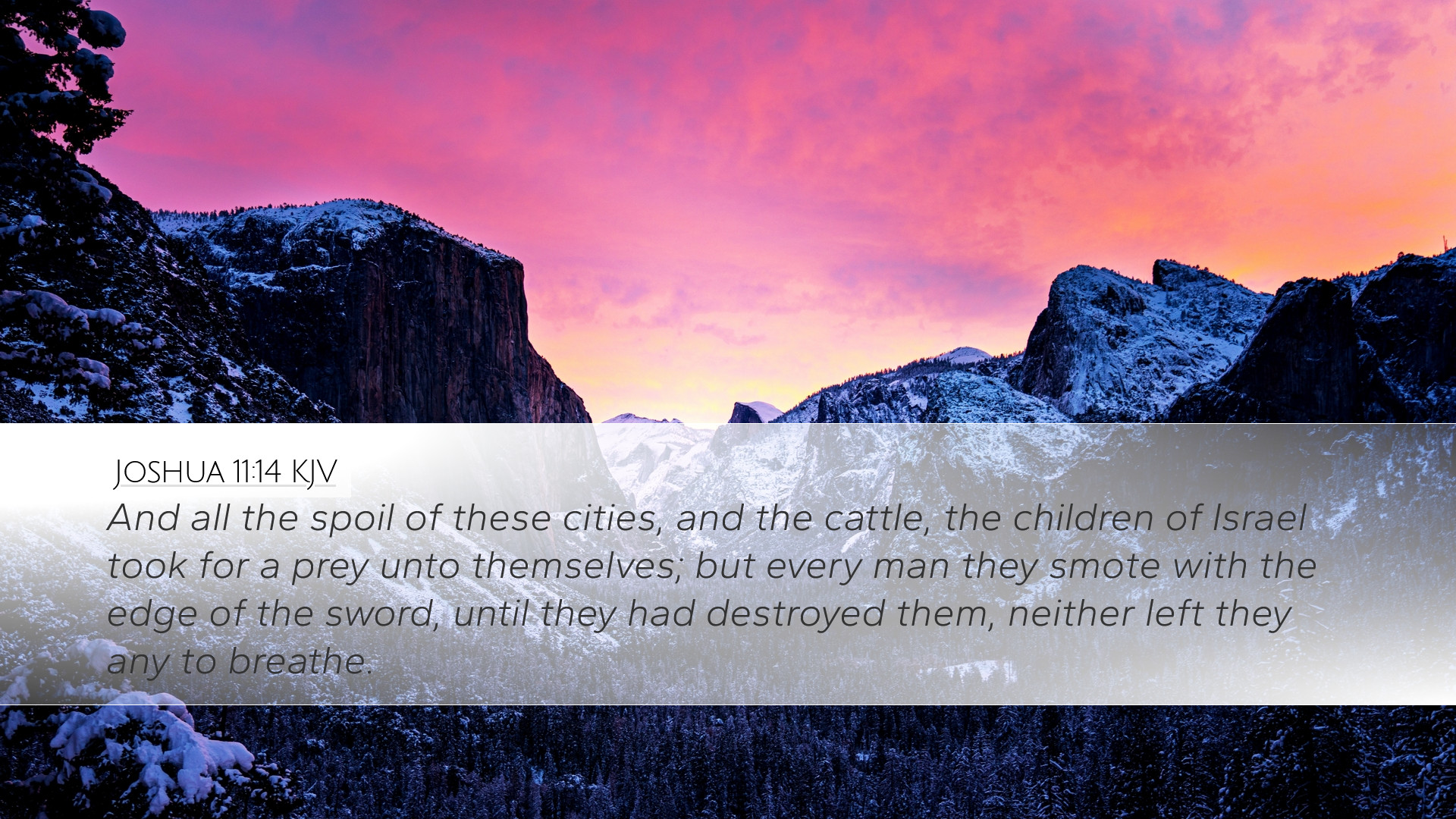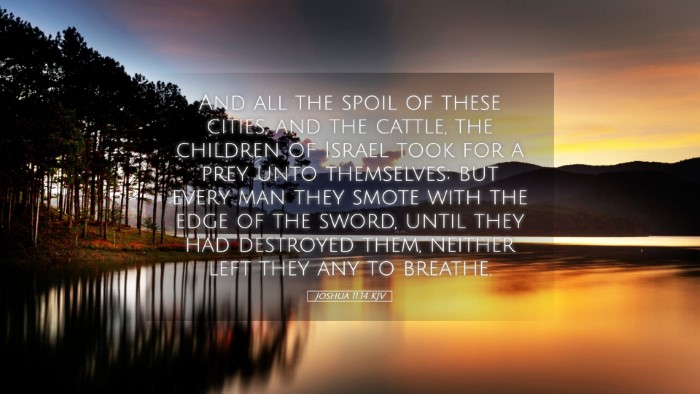Old Testament
Genesis Exodus Leviticus Numbers Deuteronomy Joshua Judges Ruth 1 Samuel 2 Samuel 1 Kings 2 Kings 1 Chronicles 2 Chronicles Ezra Nehemiah Esther Job Psalms Proverbs Ecclesiastes Song of Solomon Isaiah Jeremiah Lamentations Ezekiel Daniel Hosea Joel Amos Obadiah Jonah Micah Nahum Habakkuk Zephaniah Haggai Zechariah MalachiJoshua 11:14
Joshua 11:14 KJV
And all the spoil of these cities, and the cattle, the children of Israel took for a prey unto themselves; but every man they smote with the edge of the sword, until they had destroyed them, neither left they any to breathe.
Joshua 11:14 Bible Commentary
Commentary on Joshua 11:14
Verse Text: "And the children of Israel took all the spoil of these cities, and the cattle; but every man they smote with the edge of the sword, until they had destroyed them, neither left they any to breathe."
Introduction
This verse encapsulates a critical moment in Israel's conquest of Canaan, illustrating both the fulfillment of divine promise and the implementation of divine judgment against the Canaanite nations. It is essential for scholars and pastors to understand the historical context and theological implications of this event.
Matthew Henry's Insights
Matthew Henry emphasizes the thoroughness of the Israelites' victory and the divine mandate behind their actions. He notes that the complete destruction of the Canaanites reflects God's judgment upon a people marked by moral corruption and idolatry. Furthermore, Henry draws a parallel between Israel's conquest and the concept of spiritual warfare in the believer's life today, where believers are called to eradicate sin with equal diligence.
Key Points from Henry:
- Divine Justification: The destruction was not merely an act of war but a divine command reflecting God’s judgment against wickedness.
- Lessons for Today: Just as Israel was called to eradicate physical threats, believers today must confront and eliminate spiritual dangers.
- Resourcefulness: The taking of spoils signifies God’s provision for Israel, illustrating the concept of reward after obedience.
Albert Barnes' Commentary
Albert Barnes brings attention to the military strategy employed by the Israelites, noting that God assisted them in securing victories over stronger foes. Barnes highlights the significance of obedience to God's commands in achieving success in their endeavors, both militarily and spiritually.
Key Themes from Barnes:
- The Role of Obedience: Success is tied to following God’s will, as exemplified by the Israelites’ victory in battle.
- Divine Assistance: The effectiveness of Israel's military actions was a result of divine intervention, reinforcing God's sovereignty.
- Material Blessings: The spoils gained are a testament to God’s grace and provision, rewarding the faithful with tangible blessings.
Adam Clarke’s Analysis
Adam Clarke provides a more detailed examination of the historical and cultural context surrounding the events. He notes the significance of the phrase "neither left they any to breathe," interpreting it as a fulfillment of God’s command to completely destroy the inhabitants of the land. Clarke's scholarly approach brings insights into the consequences of disobedience seen later in Israel’s history.
Clarke's Key Observations:
- Historical Context: Understanding the brutal reality of ancient warfare helps grasp the directives given to Israel.
- Judgment and Divine Will: The eradication of Canaanites serves as a warning about the gravity of sin and the extent of divine judgment.
- Future Implications: The obliteration of these nations foreshadows consequences for Israel when they fail to obey future commands.
Theological Implications
The command to destroy the inhabitants of Canaan raises complex theological discussions about violence in the Old Testament. It challenges modern readers to reconcile God's justice and mercy. A central theme in this narrative is the holiness of God and His intolerance for sin. The complete destruction serves as a graphic reminder that sin must be dealt with decisively.
Discussion Points for Scholars and Pastors:
- Understanding Context: Recognizing the cultural and historical milieu of the text is essential for appropriate interpretation.
- God’s Holiness: The narrative reveals God’s commitment to holiness, calling His people to reflect His character by confronting sin.
- Application for Today: How do we apply the lessons of judgment and warfare in a modern, grace-filled context?
Conclusion
Joshua 11:14 serves as a significant verse in understanding the broader narrative of Israel's conquest and God's covenantal faithfulness. The insights from Matthew Henry, Albert Barnes, and Adam Clarke enrich our comprehension and encourage deeper reflection on the interplay between divine justice and mercy, both in ancient times and for contemporary faith practices.


